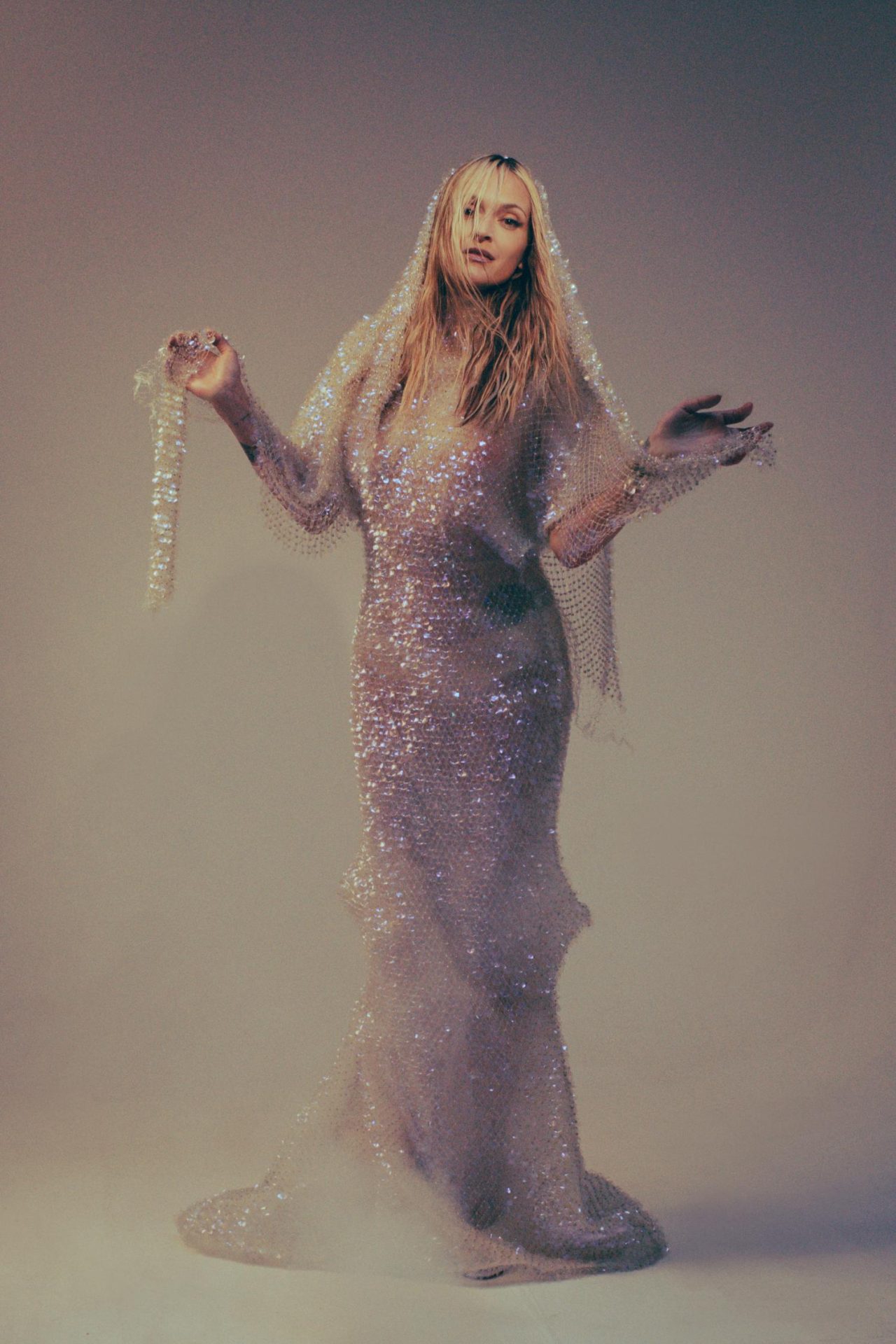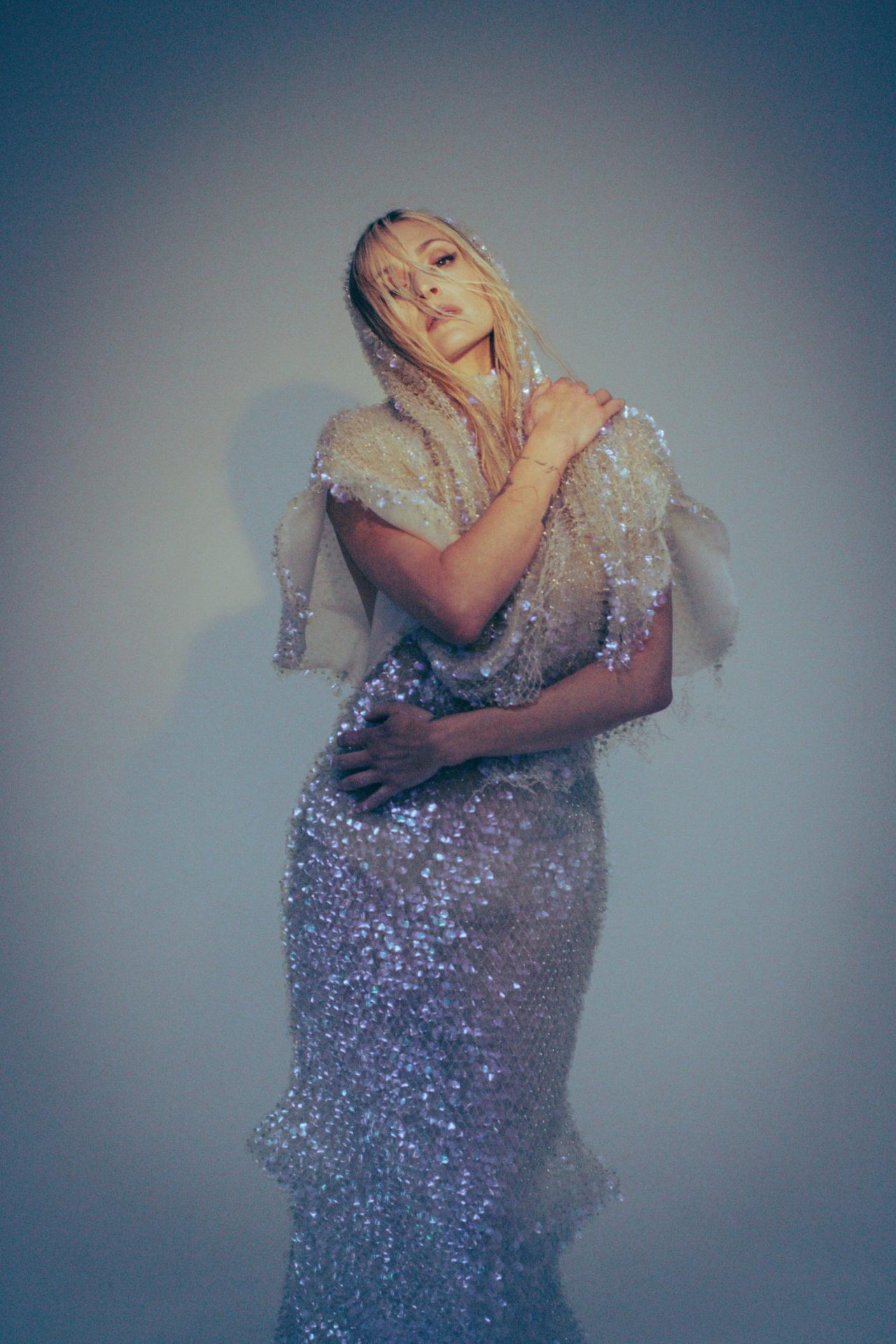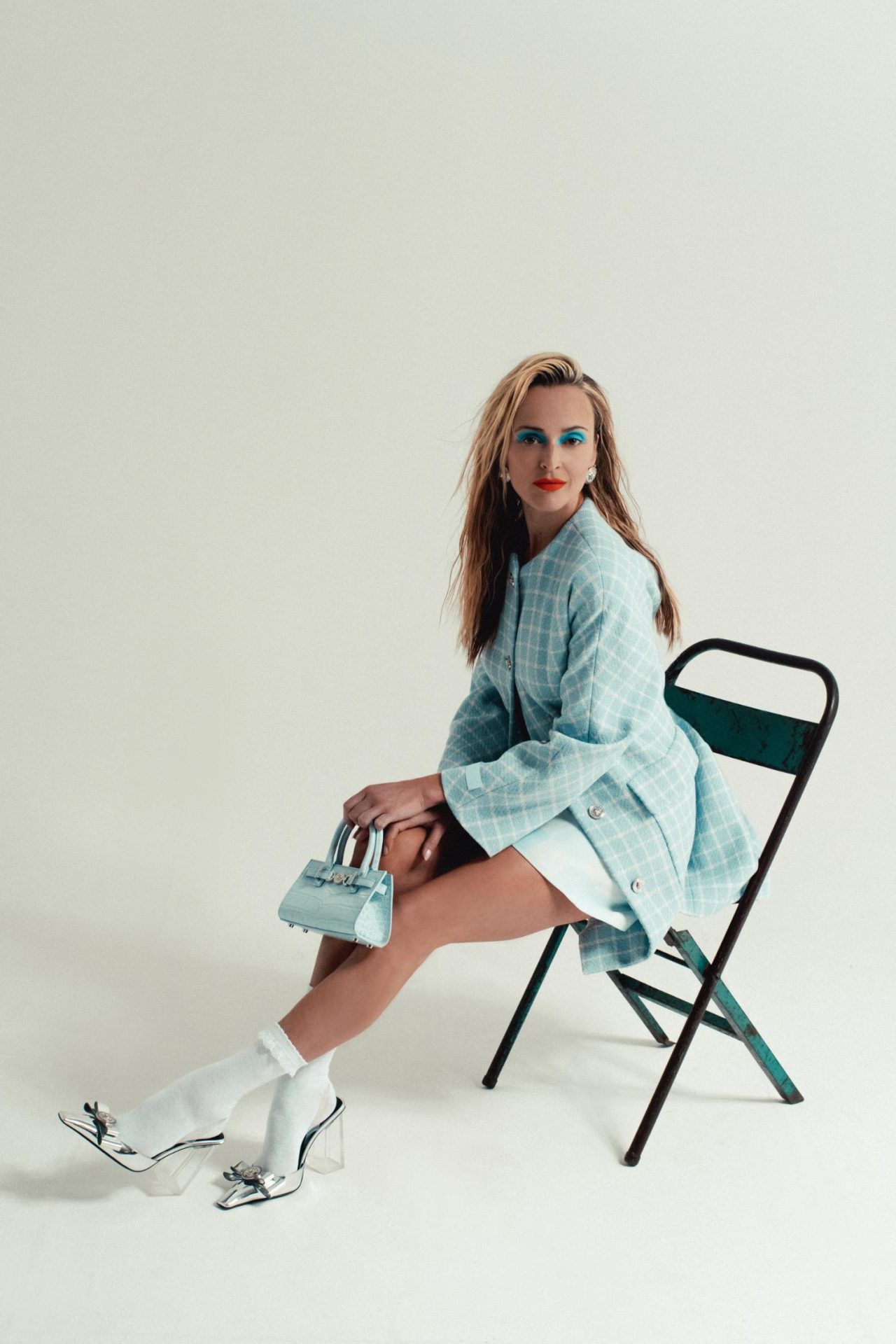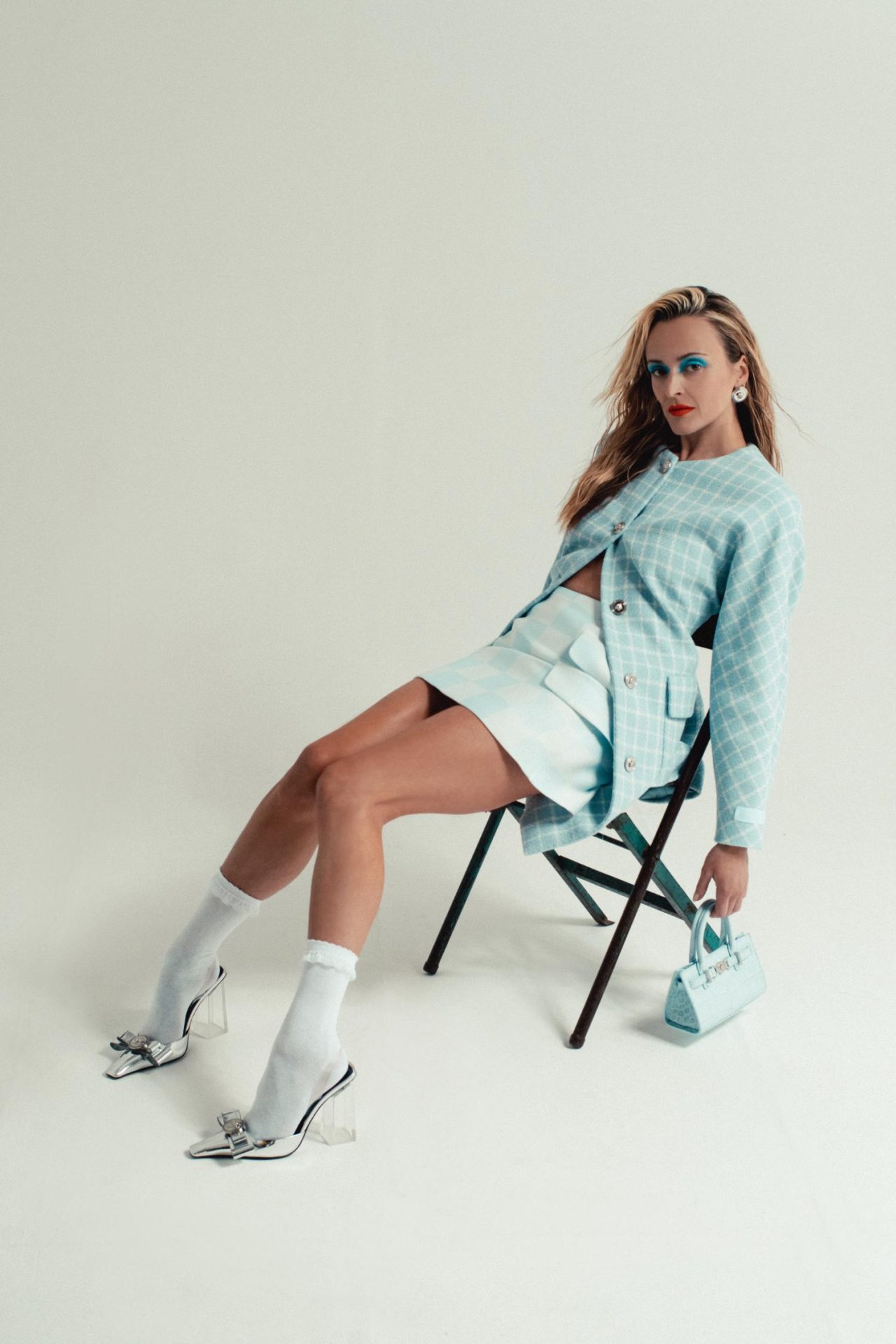Fearne Cotton FAULT Magazine Covershoot and Interview
Fearne Cotton FAULT Magazine Covershoot and Interview

Dress: Karina Bond
Shoes: Freya Rose
Stylist Ahmad Alek using SÈVE
Hair Sven Bayerbach at Carol Hayes Management using Maria Nila
Make-Up Justine Jenkins using Hourglass Cosmetics
Fashion assistant Luna Huonder
Special thanks Crixus Studios

Sunglasses: Stylist’s Own
Coat: Dolce and Gabbana
Bodice: Dolce and Gabbana
Shoes: Dolce and Gabbana
Glovers: Stylist’s Own

Sunglasses: Stylist’s Own
Coat: Dolce and Gabbana
Bodice: Dolce and Gabbana
Shoes: Dolce and Gabbana
Glovers: Stylist’s Own
Fearne Cotton first burst onto British Television in 1996, at the young age of 15. In her TV/ radio career that spanned over 25 years, she would present some of Britain’s most iconic shows such as Top of The Pops (alongside previous FAULT star Reggie Yates) Celebrity Juice and Children in Need as well as crafting a formidable radio hosting career. Fearne would famously take a step back from her TV and radio projects citing her mental health struggles and instead channel her energy into her Podcast, Festival and all round mental health haven entitled “Happy Place”.
Now Fearne Cotton is set to step out with her debut fiction novel ‘Scripted’ – a story that will explore the notion of the preordained through the eyes of protagonist Jade Shaw.
We caught up with Fearne Cotton to hear more about the novel, her television career and of course, her FAULTs.


Dress: Karina Bond
Shoes: Freya Rose

FAULT Magazine – Had you always aspired to write a novel, or was it a more spontaneous inspiration?
Fearne Cotton – I wasn’t necessarily fixated on writing a novel; I was in a good groove writing nonfiction then, one day I was out running on the same route Jade takes at the beginning of the book. I was looking around at all the trash and this weird thought popped into my head: what if I found a script of my life on the floor? I don’t know why exactly, but it wouldn’t leave me alone.
Later that day, I told my writer friend Claire about the idea. I mentioned I thought it might be a novel, but I had no idea how to even start. She said, “Just start writing it tomorrow.”
So, the next day, true to my non-procrastinating nature, I opened my laptop and began writing. It was a secret project for a long time, until I had around 40,000 words written. I thought I’d better get some feedback, just in case it was terrible! She loved the idea and encouraged me to keep going. I finished the book and then focused on finding a publisher.
It was a steep learning curve, but I absolutely loved every minute of it. The editing process probably took about a year, but I wouldn’t trade the experience. From that initial run to holding the finished book in my hands, it took about two years.

Dress: Karina Bond
Shoes: Freya Rose

As you developed Jade as a character, did you find yourself writing yourself into the character wr were you conscious of making sure you kept your authorial voice out of it?
Fearne Cotton – I think it’s always a bit of both. I think most writers would say it’s very hard not to put something of yourself in there. I think all of us feel like we can’t say exactly what we want to say. My reasons will be different to your reasons, different to the reader’s reasons. Some might be based in childhood, but certainly I think also when I was working in mainstream media, there’s so little space to say what you really want to say, a lot of the time. I started working when I was a teenager, and I was some random kid from the suburbs. I felt like I couldn’t say what I really wanted to say, and it’s taken me to get to my forties to work that one out.
I’ve allowed Jade to discover that a little bit earlier with the help of these scripts motivating her to do so.
But what I’ve been careful to do is make sure that all other areas of Jade are almost the antithesis of what I experienced. So Jade’s got this nightmarish Sister Lily, whereas I’ve got the sweetest, kindest most kind-natured brother ever [laughs]. I wanted to play around with things that felt almost like I was playing with dolls.
I don’t want people to think of me when they’re reading it [laughs], that’s my worst fear. So with the audiobook, we got the brilliant Erin Doherty to record it.

Dress: Karina Bond
Shoes: Freya Rose

Is the idea of scripts and life being preordained something you’ve felt with your own life?
Fearne Cotton – I think it’s less about external circumstances in my own life and more about the roles we all subconsciously play. You act differently around your parents, your boss, your schoolmates, or your work friends. It might be subtle, but we all do it.
The problem is when we get stuck in a role. Maybe you have a dynamic with your sister like Jade’s, where you’re always the responsible one who fixes everything. If that was set in childhood, you might carry it into adulthood. You might wonder why you’re always stuck in that role, but you can choose to break free. We all have the potential to get stuck in roles, but we can also change. It’s difficult and uncomfortable, but we can all decide to stop playing a role that no longer serves us, maybe because we’ve outgrown it or are questioning it.

Top: Chet Lo at Koibird
Skirt: Chet Lo at Koibird
Shoes: Versace
Earrings: Stylist’s Own
You explore the idea of comfort in the book. Do you think Jade found comfort in those familiar roles, even if she felt stuck?
Fearne Cotton – Without a doubt. It’s sadly human nature to be incredibly lazy [laughs]. We cling to the safety of what’s familiar, even if we hate it. It takes real courage to make any change, even something tiny that seems insignificant to an outsider. It can feel huge. Maybe you always say yes to a friend, even when it inconveniences you. It takes bravery to finally say, “I’m not going to do that anymore.” And it doesn’t have to be aggressive or confrontational. It’s just about being your true, authentic self, which might sound cliché, but it’s something we all forget sometimes. We just fall into the comfort of what’s familiar and safe. It’s scary to do something different, even make tiny adjustments to how we interact with people.

Top: Chet Lo at Koibird
Skirt: Chet Lo at Koibird
Shoes: Versace
Earrings: Stylist’s Own

This isn’t your first book, was there anything that felt different about writing this one compared to your previous work?
Fearne Cotton – Absolutely. This one was definitely much longer. With my nonfiction books, the foundation is always my own experiences, interwoven with insights from amazing people I’ve met. There’s a kind of safety in that.
This feels strangely more exposing than my previous books, even though they were more personal. This one is my own little idea that I’ve nurtured and truly believe in. Now I have to put it out there, and I think I might just have to block out any feedback. I know I’ve loved writing it, and that has to be enough.

Earrings: Aloë
Shirt: Stylist’s Own
Skirt: Cultnaked
Socks: Stylist’s Own
Shoes: Stylist’s Own

Reviews can be brutal, especially literary reviews. Even though you know this isn’t an autobiography, it must feel like a lot of pressure considering how much of yourself and your personality you’ve poured into this book.
Fearne Cotton – Absolutely, it’s terrifying! That’s why I need to be disciplined and avoid looking at reviews. In the end, I’m not a brain surgeon [laughs]. I’m not changing government policy or anything that serious. I just want people to enjoy the book, maybe even find it thought-provoking. If they don’t, that’s okay too.
Luckily, or maybe unluckily, I’m very used to criticism [laughs]. I’ve been in the public eye for 26 years, and it can be awful and soul-destroying at times. But you learn to take it with a grain of salt. After being in the public eye for so long, you realize that a lot of criticism isn’t really about you. It’s more about other people projecting their own issues onto you. If my work sparks something in someone, that’s for them to deal with. I never write to be controversial or cause harm.
So, if people just don’t like the book, I have to accept that and move on. The only thing I really need to protect is my confidence to keep trying new things. I’ve always followed my instincts about what feels right for me, and I don’t want to lose that. You never want to get to a point where you lose all your confidence and stop putting yourself out there.
That’s wrong. No matter the feedback, if you’re doing something creative for fun, to help others, or to try something new, you should always keep going and ignore the negativity. While I’m not saving lives, it does take courage to put yourself out there creatively, whether you’re a musician, a poet, or an artist. It’s risky, and people underestimate that. It can be brutal, but you have to put yourself out there anyway.
Earlier, you mentioned it took you until recent years to find your voice and speak up for yourself. What gave you that confidence? Was it just age, or was there something more?
Fearne Cotton – It’s probably a combination of things. There’s definitely a cliché about your forties giving you a better sense of self because you have more life experience. Let me tell you, my life has been crazy, both personally and publicly. And through it all, you develop resilience and a desire to advocate for what you believe in. That’s the beauty of getting older. I actually enjoy my forties! Sure, my body isn’t the same as it used to be, but that’s just part of life.
The important thing is, I’m feeling a shift. I’m not perfect, and I wouldn’t say I’m the ultimate example of authenticity or self-expression, but there’s a change.
For example, doing this FAULT Magazine Covershoot – I would have hated it 20 years ago. I would have felt out of place, awkward, and like I didn’t belong. I would have been insecure the whole time. Now? I show up to a cool photoshoot with a cool stylist and all these amazing clothes as myself – an exhausted mom who’s juggling a lot [laughs]. I don’t feel like I need to act cool. I know I’m not cool, and I never have been. But I can still have a lot of fun dressing up, working with creative people, and getting a great outcome.
Everything feels different now, and it’s a much healthier perspective than I used to have. It allows for more humor, self-compassion, and presence in the moment.

Skirt: Versace
Earrings: Versace
Shoes: Versace
Bag: Versace
Socks: Stylist’s Own

Given your long career, do you ever take a moment to recognize the impact of your work? Do you ever consciously reflect on that, or does it just pass you by in a blur?
Fearne Cotton – Honestly, not usually. I don’t want to get self-important and think my work is more important than it is. That wouldn’t be helpful. So I probably don’t dwell on it much.
But, the Happy Place Festival we hold twice a year is a different story. It’s actually quite moving because the podcast creates a safe space, people feel comfortable approaching me and sharing their stories. Sometimes, these stories are difficult and painful, but they also tell me the podcast or a book of mine was a turning point for them, or a source of comfort. That really hits me. It’s motivating because it makes me realize we need these safe spaces like Happy Place, where people can try new things and hear new conversations. But it also makes me think, “Oh my gosh, this is a responsibility.” It’s not something I take lightly.

Skirt: Versace
Earrings: Versace
Shoes: Versace
Bag: Versace
Socks: Stylist’s Own
What is your FAULT?
Fearne Cotton – Being incredibly hard on myself. I think that affects a lot of things, including how I interact with others, which isn’t great. And it also prevents me from feeling any sense of calm, which I would really like to achieve.
I’m in therapy. I’m very lucky to have a brilliant therapist, and it’s definitely helping. I need to go easier on myself. Sometimes I just don’t know how to reach that level of self-compassion.
Being in the public eye is probably not helping this FAULT of mine. Other people point out all your flaws quite happily, and they seem to enjoy it – it’s not a nice part of the job. Any mistake, minor or major, is emphasised and blown out of proportion. It’s awful. I’m not blaming the public entirely, but it certainly makes it harder for me to give myself a break. The message I sometimes get is, “Oh, you can’t give yourself a break? You’re a jerk!” You know what I mean? Thankfully, that doesn’t happen as often these days, but it’s still not easy. I’d say that’s a big challenge for me.